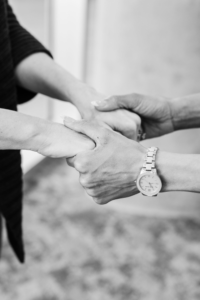“No, my brother!” She (Tamar) cried. “Don’t’ be foolish! Don’t do this to me! Such wicked things aren’t done in Israel.” 2 Samuel 13:12
The Bible is a book of reality as it portrays the brokenness in the world without attempting to “cover up” the potential damage one person can inflict on another. Sadly the pain includes abuse which has horrible effects on all who suffer whether mentally, emotionally, and/or physically. 2 Samuel 13 portrays a tragic scene where David’s son Absalom rapes his half-sister Tamar; the remainder of the chapter reveals the subsequent implosion on the family structure.
I encourage you to read the whole chapter whether you have been a victim of abuse or know someone who has or is suffering. All too often the chapters of women’s stories include abuse. Abuse takes many forms – whether verbal, physical, sexual, emotional, or spiritual and can occur as an isolated incident or ongoing behavior. On numerous occasions there is a combination of abusive encounters.
I am offering reflections and overall principles from the painful interaction between Amnon and Tamar in 2 Samuel 13 to lend understanding. By no means are these meant to be exhaustive or provide a solution for a woman who finds herself in an abusive situation. If you currently are being abused, I am pleading with you to tell a trustworthy person(s) or call an abuse hotline (see Sacred Story’s “Helpful Links” for information) where you can be pointed toward help, counsel, and resources.
Tamar was Amnon’s half-sister. The relationship which was supposed to be a vessel of love and protection in her life became a great tool of damage. Abuse within relationships where love and protection are supposed to be offered results in intense feelings of shame and betrayal for the victim. Not only does the victim not receive what the relationship is designed to do but also suffers the rejection of someone whose God-given role is to be a safe person.
Amnon’s twisted thinking perverted his discernment of what it meant to “love” Tamar versus what it meant to “lust” for her through violence. Jonadab fed Ammon’s wickedness by helping him devise a plan (vss. 3-5). The abuser is deceived in his thoughts about himself, God, and others. This deception may be fed by the world system. Our spiritual enemy, the demonic realm, works through the distorted mind of abusers to wreak havoc. This doesn’t mean the abuser is absolved of his or her actions – far from it as God holds individuals responsible for their actions but instead a reminder that there is an unseen spiritual battle raging behind the scenes.
Tamar pleads with Amnon to turn from the evil consequences of rape which would make him a fool and corrupt her reputation for a future marriage among other painful outcomes. She implores him to speak with their father King David (vss.12-14). Abuse is not only a violation of the abused but also a choice on the part of the abuser to harden his or her heart which results in more damage. Tamar does not blame herself but instead clearly places the blame on her perpetrator. Amnon refuses to submit to God or seek out a godly perspective. When a woman faces abuse, the tendency is to feel like she is to blame in some way. There are no grounds for blaming herself. The abuser is sinning by refusing to submit to God and receive help and perspective from godly people.
Tamar gives Amnon the chance to deal with his wickedness in a way that promotes dignity. She tells Ammon not to send her away after the rape because it is creating harm upon harm. Within ancient culture she is asking him to salvage his wrongdoing and her reputation by seeking out a way to restore both. Instead of crying out for mercy from God and seeking forgiveness, Amnon hardens his heart and orders her removed from his sight (vss.15-18). She leaves and immediately begins grieving her losses by tearing her garment, putting ashes on herself, and crying aloud (vs. 19). Abusers will divert their self-hatred and guilt by directing more anger and hate toward the person they are abusing. Like Tamar, the healing process begins by grieving the losses incurred by the abuse. No matter what form the abuse take there are always reasons to grieve: the loss of a secure childhood, dignity, love, a dream, a relationship, trust, physical health, emotional stability, and more.
Being abused is an experience of evil that can take months and years to recover. The hopeful news for such a devastating topic is the truth of God’s Word: what the enemy intends for evil God can turn for good (Genesis 20:50), mourning will be part of getting through the pain but joy will come eventually (Psalm 30:5), God’s compassion and comfort is abundant (Psalm 103:13), God works all things together for the good of those who trust Him (Romans 8:28), He uses the pain in people’s lives to give them purpose in comforting others (2 Corinthians 1:3-4), power is available in Christ to forgive those who do inflict harm, forgiveness is available for those who have acted out by abusing (Colossians 3:13) and God’s justice will prevail in punishing evil deeds (2 Timothy 4:14).
Sister, I know this is not an easy topic. My heart breaks for any of you who experiences abuse in any form. It leaves a lot of room for lamenting “why God?” and I can’t even presume to have an answer. I do find great encouragement in the stories of redemption like Deb’s Story Abused to Adored and Renee’s Story My Island Life. I also find great hope for those who are caught in the bondange of being the abuser in Jennifer’s Story Walking on Eggshells. What have you seen God do in your life or others who have been through abuse?
Laura

